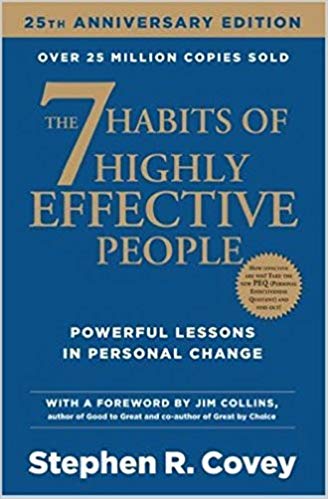

This article is an excerpt from the Shortform summary of "The 7 Habits of Highly Effective People" by Stephen Covey. Shortform has the world's best summaries of books you should be reading.
Like this article? Sign up for a free trial here .
Do you want to make your life better? Are you struggling in your personal or professional life, your interactions with other people, your life balance, or your life’s purpose? Have you made attempts to fix these issues — from workshops to self-help books to counseling — with little or no success? Try the “inside out” approach.
7 Habits of Highly Effective People endorses an inside out approach to improving yourself and your life. This method starts with examining and adjusting your character, your motives, and how you see the world; only when you start from the foundation of your character and your worldview can you make lasting behavioral changes.
How Do the 7 Habits Use an Inside Out Approach?
The 7 Habits are designed to build from the foundation up — or the inside out approach — to establish a mindset, habits, and skills that help you identify and achieve the things that are most important to you. You don’t need to perfect each habit before moving onto the next; as you progress and grow, you will naturally continue to improve in all the previous habits. This is not a quick-fix program that you work through once and move on, it’s an ongoing process of personal growth and change.
This inside out approach entails
- Making improvements to your character before your personality
- Focusing on principles before practices
- Adjusting your paradigms, or how you see the world, in order to change your actions
- Improving yourself (achieving so-called “private victories”) before you can build better relationships with others (“public victories”)
Your habits are the expressions of your character; more than simple actions like having a habit of showering at night or going to the gym after work, habits include tendencies like procrastination and selfishness. Habits are behaviors that we perform unconsciously and repeatedly, day after day, that reveal our values and priorities. So by working on your character, you can use the inside out approach to change your habits.
Habits are tremendously powerful because they are generally unconscious and are ingrained in your routines; if you persist in the same habits, you will continue to see the same results in your life. However, with time, effort and commitment, you can break your habits and form new ones to produce the life and results you want. Through new habits, you can form new paradigms while breaking old paradigms that have been holding you back.
Habits are formed at the intersection of knowledge, skill, and desire. All three are necessary to create a lasting habit.
- Knowledge: What you need to do to achieve a result and why
- Skill: How to achieve it
- Desire: Your motivation to achieve it
Here’s an example of using an inside out approach. Imagine you want to improve your interactions with others because you tend to talk more than you listen, and you find this approach is generally ineffective — leading to misunderstandings, tension, and dynamics that are neither harmonious nor productive. To change your habit, you need to address all three aspects.
- First, you have to figure out what you’re doing (not listening) and understand why that’s creating the problem.
- Second, you have to learn the skills to become an active listener.
- Third, you have to truly want to make the effort to change.
Working Through the Habits, Inside Out
Covey suggests two paradigm shifts readers should make to gain the most benefit from reading 7 Habits. You can see that these shifts also require you to think carefully about why you’re reading, and use the inside out approach to do so.
First, don’t read it once and put it back on the shelf, as you would any other book. This book is designed to be a guide for repeated reference as readers continually grow and improve through the 7 Habits. As mentioned earlier, you won’t master the habits right away; it will be a process of deepening understanding and application, and using the inside out approach to ask yourself why you want to improve.
Second, read this book as if you’re going to teach it to someone else. This mindset encourages you to seek a more thorough understanding of the importance and implementation of the 7 Habits than if you were passively absorbing the information as a mere student.
As you start incorporating the 7 Habits into your life and using the inside out approach, you’ll notice several effects in your life.
- As you work through Habits 1-3 and accomplish your Private Victories, you’ll understand yourself better and feel more confidence and self-worth. Others’ opinions of you will carry less weight, and you’ll begin to recognize how others’ actions reflect their opinions of themselves and how they see the world.
- As you achieve Public Victories through Habits 4-6, you’ll gain the knowledge, skills, and motivation to improve your relationships with others.
- Finally, when you reach Habit 7, you’ll achieve true independence and become capable of interdependence. This habit will help you stay energized and will bring happiness and balance to your life.
Working through the 7 Habits takes time a self-reflection. You can successfully work through the 7 Habits by using the inside out approach By understanding the fundamental aspects of your character, you can learn who you are and why you do the things you do, you can change your behavior and habits for the long term.
———End of Preview———

Like what you just read? Read the rest of the world's best summary of "The 7 Habits of Highly Effective People" at Shortform . Learn the book's critical concepts in 20 minutes or less .
Here's what you'll find in our full The 7 Habits of Highly Effective People summary :
- How to prioritize the hundred tasks you have to focus on the one or two that really matter
- The right way to resolve every disagreement and argument
- How to avoid burning out and succeed over 20+ years






